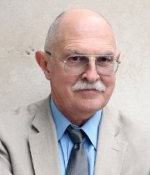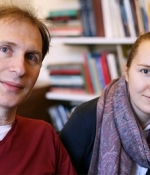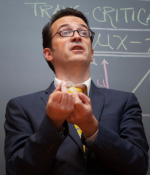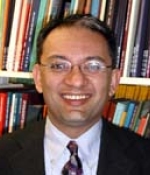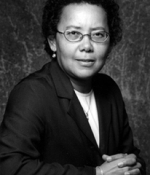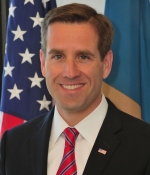2016
Spafford Wins NEH Fellowship to Study Japan’s Warrior Houses
David Spafford, assistant professor of East Asian Languages and Civilizations, has been awarded a fellowship from the National Endowment for the Humanities (NEH) to study the corporate warrior house in Japan from 1450 to 1650. He is researching the social functions of the warrior house, exploring in particular practices and ideas about family identity, survival, and legacy.
People More Likely to Defer Making Decisions the Longer They Wait
Would you rather eat an apple or a banana? Read Moby Dick or A Tale of Two Cities? Is a cup or a mug holding that coffee?How quickly the decision gets made matters. That’s because the longer someone takes to draw a conclusion, the more likely that person will disengage from the process altogether and simply never decide.
Researcher Looks at Healthy Changes Through a Political Lens
In Governing With Words: The Political Dialogue on Race, Public Policy and Inequality in America, Daniel Gillion says politicians are sharers of health information with the potential to increase awareness of health issues and advise minorities on best practices.Gillion, an associate professor of political science, focuses his research on racial and ethnic politics, political behavior, public opinion, and the American presidency.
Study Finds Well-Being Necessary Part of Public Policy Agenda
“Well-being can and should drive public policy, from the most local to the most international levels.”
Two Scientists Elected to the National Academy of Sciences
Marsha Lester, Edmund J. Kahn Distinguished Professor of Chemistry, and Andrea Liu, Hepburn Professor of Physics, have been elected to the National Academy of Sciences, considered one of the highest honors accorded a U.S. scientist or engineer.Selected for "their distinguished and continuing achievements in original research," the scientists are part of the 2016 Academy class of 84 members and 21 foreign associates from 14 countries.
Penn Arts and Sciences Launches Vagelos Institute for Energy Science and Technology
Penn Arts and Sciences has announced the creation of the Vagelos Institute of Energy Science and Technology. The new institute will bring together world-class researchers to solve scientific and technological problems related to alternative sources of energy and energy use and storage, reinforcing the University of Pennsylvania’s position as one of the premier energy research and technology centers in the nation.
Penn Joins in $40 Million Grant to Establish Simons Observatory
The Simons Foundation has awarded a $38.4 million grant to establish the Simons Observatory, a new astronomy facility in Chile’s Atacama Desert that will merge and expand existing efforts to explore the evolution of the universe from its earliest moments to today. An additional $1.7 million of support is being provided by the Heising-Simons Foundation.
Roger Chartier Elected to the American Academy of Arts and Sciences
Roger Chartier, Annenberg Visiting Professor in History at Penn Arts and Sciences and professor at the College de France, has been elected to the American Academy of Arts and Sciences. He is among 213 who make up the Academy’s 236th class of national and international scholars, artists, writers, philanthropists and civic and business leaders.
Extreme Rainfall Doesn’t Always Mean Extreme Erosion
In the Puerto Rican rain forest, a strong storm can drop a meter of rain in a single day. All that water rushes into mountain rivers and causes a torrent as the water overflows the riverbanks and charges downstream. It seems intuitive that the force of so much water would lead to massive erosion of a riverbed. But according to a new study, that intuition is incorrect.
Rogers Smith Elected to American Philosophical Society
Rogers Smith, Christopher H. Browne Distinguished Professor of Political Science, has been elected a member of the American Philosophical Society (APS). The APS was founded in 1743 by Benjamin Franklin and John Bartram, three years after the founding of the University of Pennsylvania. Its past members include Alexander Hamilton, Marie Curie, and Albert Einstein.
Michael Platt Earns NIH Award for Neural Circuitry Work
Michael Platt, James S. Riepe University Professor, has received a five-year, $2.9 million Method to Extend Research In Time, or MERIT, award from the National Institute of Mental Health to continue his work on the neural circuits that mediate complex social cognition. Program staff and scientific advisory board members within the NIH nominate candidates for these awards, which go to fewer than 5 percent of NIH-funded investigators across all disciplines.
Program to Offer Public Tours of Lower Schuylkill River
Inspired by urban river projects that have revitalized the cities of Los Angeles and New York, the Penn Program in Environmental Humanities (PPEH) is collaborating on a project with Bartram’s Garden and River Corps to increase access to the Lower Schuylkill River, helping more people connect to the storied waterway.
Two Endowed Professors Named in Penn Arts and Sciences
Dean Steven J. Fluharty is pleased to name two faculty members in the Department of Physics and Astronomy to endowed chairs in Penn Arts and Sciences.
Jane Willenbring to Study Soil Metals for Geology and Gardeners
Support from the National Science Foundation is allowing Jane Willenbring, assistant professor of earth and environmental science, to connect community gardening and the study of metal properties in soil.
Three Penn Arts and Sciences Professors Awarded 2016 Guggenheim Fellowships
Penn Arts and Sciences' Diana Mutz, Samuel A. Stouffer Chair in Political Science and Communication; Timothy Rommen, professor of music and Africana studies; and Joseph Subotnik, associate professor of chemistry, have won 2016 John Simon Guggenheim Memorial Foundation Fellowships. They are among 178 scholars, artists and scientists selected from nearly 3,000 applicants from the United States and Canada.
Bethany Wiggin Receives Whiting Public Engagement Fellowship
Bethany Wiggin, associate professor of Germanic languages and literatures and the founding director of the Penn Program in Environmental Humanities, is among the first recipients of a Whiting Public Engagement Fellowship from the Whiting Foundation.
Penn Celebrates Opening of the Stephen A. Levin Building: A New Hub for the Neural and Behavioral Sciences
Amy Gutmann and Steven Fluharty cut the ribbon dedicating the new Stephen A. Levin Building. Photo by Lisa J. Godfrey.
Researcher Uncovers the Unexpected History of Separating Church and State
A forthcoming book from a Penn Arts and Sciences professor will showcase how the formal separation of church and state moved slavery to the political sphere, but defenders of slavery argued that religious critiques of slavery violated that separation.
Randall Collins, Renowned Sociologist, Honored With Symposium
Penn's Sociology Department recently hosted “Social Interaction and Theory: A Conference in Honor of Professor Randall Collins.” Collins, who is retiring, is the Dorothy Swaine Thomas Professor of Sociology and a renowned expert on the sociology of philosophies and intellectuals, social and political conflict, macro patterns of violence, and micro-sociology.
Raising Awareness About the Media and Environmental Issues
What's the carbon footprint of your smartphone? Rahul Mukherjee’s “Environmental Media” class looks at how different types of data-driven activities affect the earth’s geology and ecosystems. It also explores the media’s depiction of environmental issues and controversies involving media infrastructures, such as cellphone towers and the possible effects on the health of nearby residents.
A Meeting of Minds: Visiting Russian Scholars Interface with Penn Arts and Sciences Faculty
This past February the Department of Slavic Languages and Literatures, together with the Perry World House, hosted Russian American Relations in Historical Perspective: A Symposium. The public event, designed to examine Russian-American relationships amidst ongoing international crises, such as the violence and destabilization in Ukraine and Syria, drew on expertise from a host of historians, political scientists, legal scholars, and cultural historians.
Penn Arts and Sciences Faculty Receive University Teaching Awards
Seven members of the Penn Arts and Sciences faculty are recipients of University-wide teaching awards:LINDBACK AWARD FOR DISTINGUISHED TEACHINGKaren Detlefsen, Associate Professor of PhilosophyJoshua Klein, Professor of Physics and AstronomyEmily Steiner, Professor of EnglishDaniel Swingley, Professor of Psychology
College Announces Graduation Speakers
Bill Shore, C’77, founder and CEO of Share Our Strength, and Laura Sorice, C’16, will speak at this year’s graduation ceremony for the University of Pennsylvania College of Arts and Sciences. The event will take place on Sunday, May 15, at 6:30 pm, at Franklin Field.
Penn Fels Policy Research Initiative Announces Interdisciplinary Grants
The Fels Policy Research Initiative has announced five inaugural collaborative grants for as much as $15,000 each, designed to further interdisciplinary partnerships. Three of the research projects involve one or more Penn Integrates Knowledge, or PIK, professors, a group of Penn academics committed to working across different disciplinary boundaries.
Justin McDaniel Works to Build Digital Library of Ancient Thai Manuscripts
Justin McDaniel, professor and chair of the religious studies department, along with the National Library of Laos, has launched the Digital Library of Northern Thai Manuscripts, bringing thousands of ancient manuscripts out of monastic temples and making them available as open source material online.
Penn Arts and Sciences Names 2016 Dean’s Scholars
Penn Arts and Sciences has named 20 students from the College of Arts and Sciences, the College of Liberal and Professional Studies, and the Graduate Division as Dean’s Scholars. This honor is presented annually to students who exhibit exceptional academic performance and intellectual promise. The 2016 Dean’s Scholars were formally recognized as part of the Levin Family Dean’s Forum on March 30. COLLEGE OF ARTS AND SCIENCES
Al Filreis Wins a Coursera Outstanding Educator Award
Al Filreis, Kelly Family Professor of English, Director of the Center for Programs in Contemporary Writing, and Faculty Director of Kelly Writers House, is the recipient of an inaugural Coursera Outstanding Educator Award.Filreis was honored with the Transformation Award, given to an instructor who has contributed the most to the platform’s vision of enabling anyone, anywhere to transform their life through its massive open online courses, or MOOCs.
Vanessa Ogle Selected for American Council of Learned Societies Fellowship
Vanessa Ogle, Julie and Martin Franklin Assistant Professor of History, has been selected for a 2016-2017 Fellowship from The American Council of Learned Societies. Ogle, who specializes in modern Europe, historical globalization, political economy and imperialism, and colonialism in Europe and the Middle East, was chosen from among 1,100 applicants who underwent a multi-stage peer-review process for the 69 fellowships.
Cullen Blake Helps to Build Next-generation Planet Finder
Cullen Blake, an assistant professor of physics and astronomy, is part of a team selected by the National Aeronautics and Space Administration’s Astrophysics Division to build a $10 million, cutting-edge instrument to detect planets orbiting stars outside our solar system.
Researcher Serves as a Thought Leader on Russian Foreign Policy
Mitchell Orenstein's research sits at the intersection of comparative politics and global public policy, using a problem-driven research approach to ask big, policy-relevant questions when it comes to the happenings in and around Central and Eastern Europe.
Why Voters Ignore Local Politics
In his new book The Increasingly United States, Associate Professor of Political Science Daniel Hopkins says American federalism was based on the idea that voters’ primary political loyalties would be with the states—but that that idea has become outdated.
Dean Fluharty Among Presenters at Environmental Humanities Event
A collective of faculty and students, with other scholars, artists and scientists near campus and beyond, are working together in the Penn Program in Environmental Humanities not only to raise awareness but also to increase engagement in the emerging field of environmental humanities. This spring the PPEH 2015-16 “Curriculum for the New Normal” series of events continues with lectures, forums, and field trips to address global-warming topics.
Two College Seniors Win 2016 President’s Engagement Prize
College seniors Vaishak Kumar and Kriya Patel have been named recipients of the 2016 President’s Engagement Prizes at the University of Pennsylvania, along with Penn Nursing’s Melanie Mariano.
Chemists Lay Groundwork for Countless New, Cleaner Uses of Methane
A research team led by Daniel J. Mindiola, Presidential Term Professor of Chemistry, has demonstrated the potential to use methane not as a fossil fuel but as a versatile chemical building block with which to make more complex molecules, such as pharmaceuticals and other value-added substances. The reaction also offers a way of taking advantage of the properties of methane without releasing greenhouse gases.
Melissa Sanchez Studies Sexuality by Looking at Renaissance Love Lyrics
Melissa Sanchez, associate professor of English, is using the language and history of 16th- and 17th-century poetry to examine issues of gender, sexuality, and romance in the past and modern-day. Sanchez, a core faculty member of gender, sexuality, and women’s studies, says that reading Renaissance texts enriches understanding of both the historical insights about the period when the literature was written and about current cultural conditions.
The Master of Environmental Studies Program Celebrates 20 Years at Penn
The Master of Environmental Studies (MES) recently celebrated its 20th anniversary at Penn. Over the past two decades, MES has championed a multi-disciplinary approach to environmental work and research, and has trained some of the most influential people in the field today. A combination of core sciences, policy knowledge, and hands-on application prepare students to tackle the complex issues facing our natural world.
From Egypt to Philadelphia, the Journey of the Penn Museum’s Sphinx
When the massive sphinx arrived at the University of Pennsylvania Museum of Archaeology and Anthropology in Philadelphia in 1913, it was eclipsed by another historic event in the city—opening day of baseball’s World Series, with the Philadelphia Athletics hosting the New York Giants. So when the ship carrying the 13-ton artifact from the ancient Egyptian capital of Memphis docked at the Delaware River waterfront on Oct. 7, 1913, no workers were there to unload it.
Penn Professor Wins Top British Liquid Crystal Society Award
Randall D. Kamien, Vicki and William Abrams Professor in the Natural Sciences in the Department of Physics and Astronomy, has won the G. W. Gray Medal of the British Liquid Crystal Society for outstanding contributions to liquid crystal science.
PIK Professor Receives Teaching Award
Robert Ghrist, Andrea Mitchell University Professor of Math and Electrical and Systems Engineering, has received the 2016 James P. Crawford Award for Distinguished College or University Teaching of Mathematics from the Eastern Pennsylvania and Delaware Section of the Mathematical Association of America (EPADEL).
Kathleen Brown Re-thinks Gender and Race in ‘Undoing Slavery’
In 1981, while teaching “Ages of Man” to 9th graders at an all-girls high school, Kathleen Brown noted the irony. Brown, now a professor of history, says that at the time she felt poorly equipped to redesign the course, which focused on political, military, and economic history from a global perspective.
Political Activist Behind a Desk: Camille Z. Charles
Camille Z. Charles believes that where you live influences everything that happens to you and sets you up for the rest of your life.Before joining the University of Pennsylvania faculty in 1998, Charles, a scholar of racial inequality, was conducting research on minority students at elite universities. She found that those who came from segregated neighborhoods weren’t faring as well academically as their white peers.
Raising Age of Majority Doesn’t Affect Teen Crime Rates
In the criminal justice world, there’s an ongoing debate about whether to increase the age of majority, the point at which an adolescent can no longer be tried in the juvenile legal system and instead must be tried as an adult. Advocates of raising this threshold say it’s unfair to process juveniles in the adult system because their brains are not fully mature. Critics of the idea say it may lead to increased recidivism among adolescents.
Asif Agha Is President-Elect of Society for Linguistic Anthropology
Asif Agha, professor of anthropology, has been voted president-elect of the Society for Linguistic Anthropology (SLA), a section of the American Anthropological Association. The SLA is the premiere society for the interdisciplinary study of how language shapes social life in the world.
Machine Learning Can Help Prevent Repeat Domestic Violence Offenses
Richard Berk, a professor of criminology and statistics in Penn Arts and Sciences and the Wharton School, and Susan B.
Seven From College Win Thouron Awards
Four Penn Arts and Sciences seniors and three alumni have received Thouron Awards to pursue graduate studies in the United Kingdom. The scholarship recipients are:
Barbara Savage Featured in Two Oxford University Lectures
Barbara Savage, a historian and the Geraldine R. Segal Professor of American Social Thought and Head of the Department of Africana Studies, was recently featured twice as a guest lecturer at Oxford University. Her lectures, "Professor Merze Tate: Diplomatic Historian, Cosmopolitan Woman" and "Creating a New Field: Black Women's Intellectual History," were followed by short responses from scholars from a variety of perspectives.
Senior and Alumna Awarded 2016 Gates Cambridge Scholarships
A senior and an alumna of the College of Arts and Sciences at Penn have both won 2016 Gates Cambridge Scholarships to pursue graduate degrees at the University of Cambridge in the United Kingdom. Lucia Calthorpe, C'16, and Morgan Seag, C'08, are among 35 United States citizens selected and are the 29th and 30th Penn recipients since the scholarships were established in 2001.
Scholarship Honoring Beau Biden Will Benefit Students at Penn
The University of Pennsylvania and the Tau Chapter of Psi Upsilon have announced the creation of the Joseph R. “Beau” Biden III Memorial Scholarship to provide financial support to an undergraduate in the College of Arts and Sciences who would otherwise be unable to meet the cost of a Penn education.
PIK Professors Call Attention to the Use of Race in Human Genetic Research
Dorothy Roberts and Sarah Tishkoff have coauthored a perspective piece published this week in the journal Science that calls for an end to the use of genetic concepts of race in biological research.




